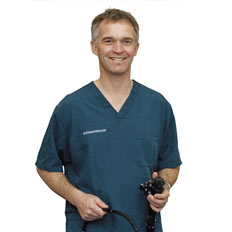 Monday 3 February 2014 12:06pm
Monday 3 February 2014 12:06pmA register, established during his years as a PhD student, has enabled Professor Richard Gearry to undertake world-leading research into inflammatory bowel disease, and help improve the diagnosis, treatment and outcomes for patients.

If he had his time again, there is one thing Professor Richard Gearry would change about his time as a medical student. Instead of stacking shelves in a Christchurch warehouse for a holiday job, he'd do a summer studentship. Or three.
“To be paid to do research for 10 weeks as a medical student is an amazing opportunity. I wish I had done that. I feel very strongly that medical students should be exposed to research throughout their training. Understanding evidence and new findings as they are discovered; understanding the limitations of research, and where research stops and the real world begins gives you a discipline that clinical medicine can never give you on its own.”
Despite missing the summer studentship experience, Gearry did complete a PhD and, for the past decade, has combined his work as a specialist gastroenterologist with research at the University of Otago, Christchurch.
He has also become one of the world's foremost researchers into the epidemiology and clinical management of inflammatory bowel disease (IBD) and other gastroenterological conditions. In recognition of this work he received the 2016 Carl Smith Medal and Rowheath Trust Award for outstanding research performance by University of Otago staff early in their research career.
As part of his PhD, Gearry established a register of Canterbury patients with IBD that has become a well-used international resource. IBD comprises Crohn's disease (CD) and ulcerative colitis (UC).
Researchers in other parts of the world had done similar studies, but as they recruited patients from specialist centres, these included only people with more severe IBD. Gearry's study included all people with IBD living in Canterbury regardless of age, sex or severity of disease.
Based on this register, he has produced a series of landmark publications on the epidemiology of IBD. These studies include information on the incidence of IBD, patterns of disease related to age, sex and race, as well as the roles of specific genes and environmental factors in the disease. Papers from this and other studies were published in the prestigious Lancet and Nature journals.
Gearry describes the human gut as an “amazing food machine” and he is constantly driven to understand how it works – and what happens when it doesn't work well.
“When I look back over the last 15 years, we have made amazing progress in the way we diagnose and treat IBD. IBD has a much stronger profile within the New Zealand health sector and we have shown that rates of IBD in Canterbury are amongst the highest in the world.
“When I see patients with IBD in the clinic now, I know that we have a greater understanding of the molecular factors behind the disease. This has allowed us to be involved in the development of new lab tests to help in the diagnosis and management of IBD, to develop new dietary advice, and perform some of the foundation work that has led to the development of new drugs.”
Gearry is a global leader in using biomarkers to assess IBD and part of an international consortium trying to identify the next tier of genes relating to the disease.
“The aim of this work is to understand the pathogenesis of IBD, to enable new drugs and other treatments to be developed. As new treatments are developed, IBD patients may have a prospect of fewer symptoms and an improved quality of life.”
He is one of only 60 experts worldwide who form the International Organisation for Inflammatory Bowel Disease, and a member of the World Organisation for Inflammatory Bowel Disease Guidelines Group.
His expertise is also recognised outside the medical world. Gearry is currently working with scientists from around New Zealand as part of the High Value Nutrition National Science Challenge. The multi-million-dollar government-funded project aims to transform New Zealand's food and beverage industry into an exporter of high-value, scientifically-proven foods for health.
Gearry says he loves his job and relishes being able to see patients as well as look at the bigger picture through research.
“I feel incredibly lucky to be a physician, seeing patients with gut problems and then using these patients and their problems as motivation for my research. You think, 'Where can I go from here, how can I approach this clinical problem in my research?' If I make a difference to this patient, that's great for them and their family, but with research I can make a difference that helps patients everywhere.”
Funding
- Bowel and Liver Trust
- Gastroenterology Research Trust
- Canterbury Medical Research Foundation
- Health Research Council
- High Value Nutrition National Science Challenge
- Ministry of Business, Innovation and Employment
- Zespri International
- Broad Medical Research Foundation
- Otago Medical Research Foundation
- Cure Kids
